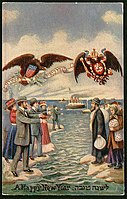Hebrew Publishing Company

Hebrew Publishing Company is an American Jewish publishing house based in New York City. The company publishes a range of Hebrew prayerbooks and other religious works, as well as many Yiddish publications.[1][2] The company was founded in the early 1900s in the Lower East Side of New York, and later was situated at the former Bank of United States building for over forty years.[3][4] The company is described as having the greatest staying power of any Yiddish publisher.[2]
Overview[]
The predecessor to the Hebrew Publishing Company was originally formed in 1883 as Rosenbaum & Werbelowsky, Inc.[5][3] The current company was founded in 1901 by Joseph Werbelowsky and his son David Werbelowsky.[6][7][8] The company also operated a bookstore.[2]
While originally founded in the Lower East Side of New York,[3] for a time located on Broadway,[9] after the collapse of the Bank of United States in 1932, the bank building at 77 Delancey Street was taken over by the Hebrew Publishing Company.[4] In 1976, after over forty years at the Delancey Street location, the company moved out from its Lower East Side location.[3]
In 1980, the company was acquired by Charles Lieber (1921–2016) from the Werbelowsky (Werbel) family.[10][11] Hundreds of the company's publications have been digitized by the Yiddish Book Center research institute.[2]
In its early years, the company geared its productions to newly arrived Orthodox Jewish immigrants who were fluent with Yiddish and Hebrew. The company produced books, educational textbooks, greeting cards, and sheet music.[2] The company also offered a range of books to assist the new immigrants with integrating into American society.[12] The first publication of the Hebrew folk song Zum Gali Gali was released by the Hebrew Publishing Company in 1939.[13] The company is thought to be the first to publish a Yiddish-English dictionary.[8]
In popular culture[]
Hebrew Publishing Company was the title of an award-winning novel by the Israeli writer .[14] In the book, the novel's protagonist, Mordechai Schuster, a newly arrived immigrant to the United States, works for his uncle at the Hebrew Publishing Company. The describes the lives of Jewish immigrants in Manhattan in the early 20th century as they engage in petty trade or work as laborers, living in poverty and overcrowded housing. The immigrants read the cheaply produced literature (known as shond in Yiddish) and sentimental stories published by the Hebrew Publishing Company.[15]
Gallery[]

Passover Haggadah by Philip Birnbaum

Greeting Card for the Jewish New Year

Yiddish sheet music
See also[]
References[]
- ^ "Hebrew Publishing Company (New York, N.Y.) [WorldCat Identities]".
- ^ Jump up to: a b c d e Baker, Zachary (2016). "The Storied History of Yiddish Publishing". PaknTreger.
- ^ Jump up to: a b c d Shenker, Israel (August 1, 1976). "It's Onward and Uptown For Hebrew Publishing (Published 1976)" – via NYTimes.com.
- ^ Jump up to: a b Sanders, R. (2013). "Delancy, Grand & Essex Streets". The Lower East Side. Dover Publications.
- ^ "Publishing". Encyclopaedia Judaica.
- ^ Greene, Victor (1992). The Ethnic Music Business. A Passion for Polka: Old-Time Ethnic Music in America. ISBN 9780520911727.
- ^ Madison, C. A. (1976). Jewish Publishing in America: The Impact of Jewish Writing, p. 77.
- ^ Jump up to: a b "D. Werbelowsky publisher, dies". The Brooklyn Daily Eagle. September 18, 1937.
- ^ Oppenheimer, M. (2007). "We're all Jews now". Thirteen and a Day. Farrar, Straus and Giroux.
- ^ Lieber, Charles D., New York Times, April 19, 2016.
- ^ "Hebrew Publishing Company". OpenSiddur.org.
- ^ Sarna, J. (2007). "Two Ambitious Goals. Jewish Publishing in the United States." In Print in Motion: The Expansion of Publishing and Reading in the United States, 1880–1940, pp. 376–91.
- ^ "Zum Gali Gali". Zemereshet.
- ^ Yudilovich, Marev (August 28, 2012). "The winners of the Bernstein Prize for Literature have been announced". Yediot Achronot.
- ^ Lev-Ari, Shiri (March 24, 2011). "What is troubling about Mordechai Schuster". Yediot Achronot.
- Publishing companies based in New York City
- Companies established in the 1900s
- Publishing companies established in the 1900s
- Jewish organizations established in the 1900s
- Jewish printing and publishing



